The Economics and Statistics Division maintains archives of previous publications for accountability purposes, but makes no updates to keep these documents current with the latest data revisions from Statistics Canada. As a result, information in older documents may not be accurate. Please exercise caution when referring to older documents. For the latest information and historical data, please contact the individual listed to the right.
<--- Return to Archive
For additional information relating to this article, please contact:
March 08, 2023MANITOBA BUDGET 2023-24 Manitoba released its 2023-24 Budget on March 7. The Province of Manitoba's Budget anticipates a deficit of $363 million (after contingency) in 2023-24. This is similar to the latest forecast of a $378 million deficit for 2022-23. In the subsequent fiscal years, Manitoba plans on declining deficits.
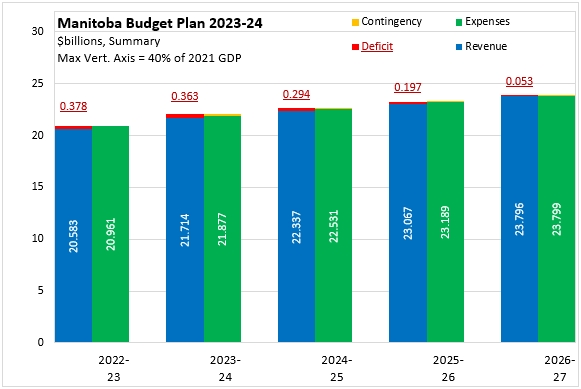
As in many provinces, Manitoba's revenues for 2022-23 grew more rapidly than expected. Manitoba's previous fiscal plan had expected a slight rise in expenditures in 2021-22 before a small decline in 2022-23. In actuality, Manitoba's expenditures were down slightly in 2021-22 and rose substantially in 2022-23.
For 2023-24, Manitoba's revenues are $1.7 billion higher than anticipated in the 2022-23 Budget outlook. Revenues and expenditures are projected to rise at a similar pace, with a slightly faster gain in revenues reducing the budget deficit by 2026-27.
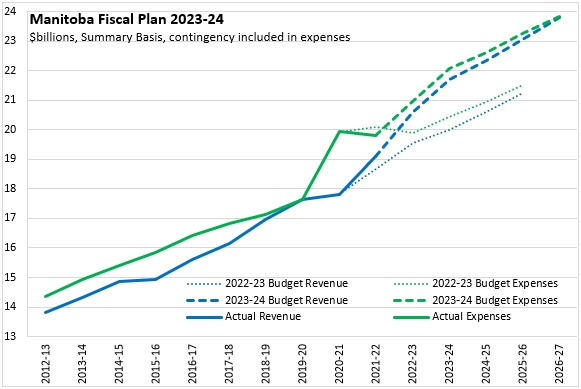
Manitoba's deficit projections represent a slight improvement over the fiscal path laid out in the 2022-23 Budget.
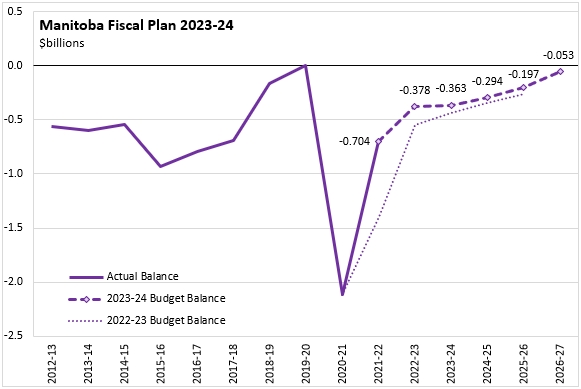
Manitoba's projected deficits in the next two years amount to 0.3-0.4% of GDP while the footprint of provincial government in the Manitoba economy remains stable at 24.4% of GDP. (Manitoba's forecast for nominal GDP ends at 2024.)
Manitoba's net debt amounted to 33.5% of GDP in 2022-23. This is projected to rise to 34.6% in 2023-24 and then peak at 35.0% of GDP in 2024-25. By 2026-27 Manitoba's debt to GDP ratio is projected to return to 34.6%.

Manitoba's Budget projects expenditures of $15,370 per capita in 2023-24, rising to $15,673 per capita in 2024-25. (Manitoba's population forecast ends at 2024.)
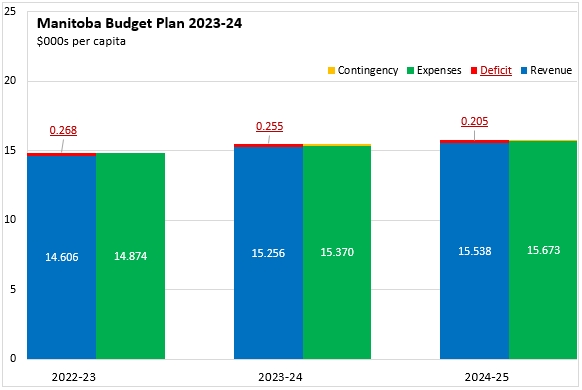
After posting growth of just under 10% in nominal terms (3.6% real), Manitoba's economic outlook projects a substantial slowdown in GDP growth. Manitoba's nominal GDP is projected to grow by 2.2% in 2023 and 3.0% in 2024 while real GDP is projected to increase by 0.7% in 2023 and 1.1% in 2024. Headwinds from inflation, tighter monetary policy, supply chain disruptions and labour shortages are all expected to contribute to slower growth. Manitoba's economy is not as sensitive to interest rate hikes as other provinces and is therefore not projected to fall into a recession.
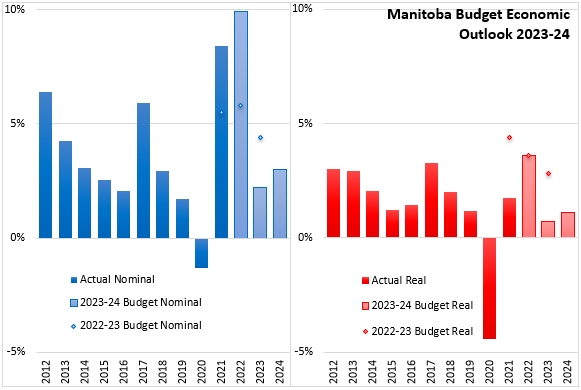
Key Measures and Initiatives
The Manitoba Budget for 2023-24 prioritizes help for Manitobans, notably
- Historic help for Manitobans, including: a $351 million package of tax reductions through a rise in the Basic Personal Amount to $15,000 for the 2023 taxation year followed by increasing tax brackets to $47,000 (up from $35,842) and $100,000 (up from $79,625) in the 2024 taxation year. Annual indexation is slated to return in 2025. Manitoba's Budget also raises the exemption threshold for the province's Health and Post-Secondary Education Tax Levy (payroll tax) from $2 million to $2.25 million in annual remuneration, along with an increase in the threshold for a reduced rate from $4 million to $4.5 million in annual remuneration.
- Safer streets, including: a $51.8 million Violent Crime Strategy over two years for policy and prosecution services, community safety initiatives and a $50 million comprehensive homelessness strategy.
- Healing health care, including: increasing health funding by 9.2% including $130 million for a diagnostic and surgical recovery task force, $200 million for a health human resource action plan, $15.9 million for community-based services for seniors and $55 million for staffing/emergency preparedness technology improvements in personal care homes.
- Stronger communities, including: creation of 2,600 child care spaces to implement $10/day daycare this year, making last year's $77 million support for teachers' wages permanent, $81 million to bring disability service workers' wages to $19/hour, increasing municipal operating funding support by $47 million, committing $160.4 million on an ongoing basis for municipal infrastructure, sustaining the Indigenous Reconciliation Initiatives Fund, $100 million over multiple years for the Arts, Culture and Sport in Community Fund.
- Opportunities ahead, including: capping post-secondary tuition growth at 2.75%, adding $50 million to the venture capital fund, $10 million to speed up mineral development permitting processes
Manitoba Budget 2023-24
<--- Return to Archive